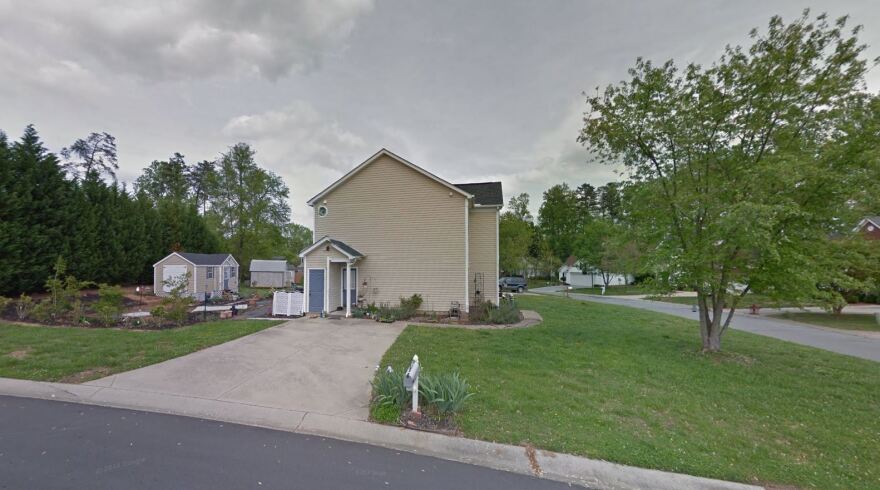Mecklenburg County’s 2011 property tax revaluation found property values were so high—and it drew so many complaints—that state lawmakers required an outside appraiser to go back and redo it. Since then, most of the emphasis has been homeowners getting tax refunds or, more recently, the hole it’s carved in the City of Charlotte’s budget. But for a small, but sizeable, portion of county homeowners, the revaluation redo has created another big problem.
Lisa Heenan owes more than $2,000 in property taxes she’s already paid. Heenan lives in a two-story vinyl-siding home in Charlotte on the edge of Mt. Holly, with her husband, Paul, her son, Alex, their dog, and fives cats.
Heenan bought the house for about $100,000 in 2008, out of foreclosure. She’s worried it’s headed back there.
In March, Mecklenburg County sent a letter. The revaluation redo found her property value had been set far too low in 2011. It would jump up 60 percent, from $73,000 to almost $120,000. The county would collect the new, higher taxes this fall, as well as back taxes for what it should have charged.
“They’re going to send my mortgage company a bill in August that’s going to be for the new value,” Heenan says. “The difference in what I paid versus what they now say I owe for 2011, 2012, 2013, 2014 and 2015.”
That’s over $2,000 for the previous years, plus increased 2015 taxes based on the new value. After talking to her mortgage company, Heenan expects about a $300 a month increase to her payments to account for those taxes. She says that’s not fair.
“Tax me on the new value going forward, no problem, we’ll find a way. But, taxing me four years back that I’ve already paid, those books are closed, that money’s already spent,” Heenan says. “It just seems abusive.”
It’s not just the Heenans; the entire neighborhood—more than 800 homes—averaged a 50 percent increase.
“Suddenly we had an awful lot of people, many of them just in moderate-to-middle-class homes, who end up with a tax bill of a thousand to 4,000 doallars that they had to pay in one year,” says Mecklenburg County commissioner Jim Puckett, who represents Heenan’s neighborhood. “Well, many of these people cannot come up with 1,000, 2, 3, 4,000 dollars just to pay their tax bill.”
All told, 8 percent of Mecklenburg County homes increased in value. Most were modest, the county says a median of $4,200—others were much larger. But regardless of size, the entire tax bill is due come September. And Mecklenburg County assessor Ken Joyner says there’s nothing the county can do about it.
“Under this particular statute, the Assessor’s Office is never even mentioned,” says Joyner.
The law requires an independent appraiser to set home values, outside county control. It sets down the process for how the county issues refunds and collects back taxes.
“The revaluation review process is a legislation that had never been done anywhere in North Carolina and to my knowledge anywhere in the nation,” Joyner says.
The bill’s author, Senator Jeff Tarte of Cornelius says that created some unexpected quirks. He never wanted to force homeowners to pay back taxes.
“It’s completely unfair,” Tarte says. “You come back four years later and say ‘oh, by the way, I didn’t bill you enough, I want to bill you more.’”
But North Carolina’s constitution says property taxes have to treat everyone in the state the same—so to allow homeowners to get refunds, others would have to pay back taxes.
Tarte says the tight timeline for repayment was an accident, so he has another bill this year to, among other things, let the county create five-year payment plans for those who now owe. It’s passed the Senate and currently in the House.
But there’s a problem: Because of how mortgages and escrow payments work, most homeowners might not get a chance to use the payment plans.
“The lender or servicer will typically pay whatever the tax bill is when it comes in,” says Joe Parsons, a senior loan officer at California mortgage lender PFS Funding and author of the blog, the Mortgage Insider. Parsons explained how lenders approach property taxes. They don’t want the government to have a tax lien on their properties, so says they’ll pay it all up front. Then, the company controls how the homeowner pays them back.
“It’s at the discretion of the lender, but they’re going to try to recover it in a year,” says Parsons. “But that may be too much of a burden on the homeowner. They may simply not be able to make that payment.”
Parsons says he’s seen lenders give two years to accommodate struggling homeowners, but not five, although he also says he’s never seen retroactive back taxes imposed.
Mecklenburg County’s tax collector confirms mortgage companies will often have discretion.
“Depending on the terms of the property owner’s mortgage, the mortgage company may exercise its right to pay the local tax lien in order to maintain a superior lien position once the tax lien is cleared,” writes Neal Dixon, the Mecklenburg County tax collector in an e-mail.
Senator Tarte says it’s up to the county to make it work.
“All to be worked out between the individual property owner and the county the best method,” Tarte says. “It’s a limited number of people and when it’s done, it doesn’t occur to any other future tax payment whatsoever.”
But for Lisa Heenan, her husband, dog, and allergic cat, that’s not exactly comforting. Heenan says for her family, the stakes are clear.
“We can’t afford a $300 a month increase, so we could very well lose our house, through nothing we’ve done wrong,” Heenan says.


